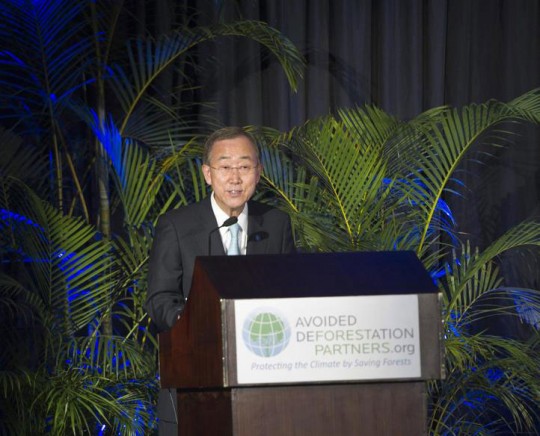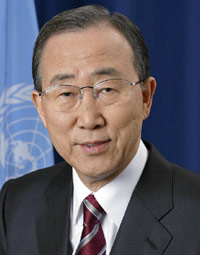Ban presses for support for UN initiative to combat deforestation
Ban presses for support for UN initiative to combat deforestation
 Secretary-General Ban Ki-moon addresses high-level forum on international forest protection in Durban, South Africa
Secretary-General Ban Ki-moon addresses high-level forum on international forest protection in Durban, South Africa
Secretary-General Ban Ki-moon called today for increased support from Member States for a United Nations initiative to slow, halt and reverse deforestation, and help developing countries manage their forests in a sustainable manner.
“I am encouraged to see that forest countries are acting to reduce deforestation, and that donor countries are pledging to support these activities,” Mr. Ban said at the UN Climate Change Conference in Durban, South Africa. “Yet, forests continue to disappear at an alarming rate. We must do more, and with a greater sense of urgency.”
The UN Collaborative Programme on Reducing Emissions from Deforestation and Forest Degradation (REDD+) seeks to create financial value for the carbon stored in forests, offering incentives for developing countries to reduce emissions and invest in low-carbon technologies to sustainable development.
Nations at last year’s UN Climate Change Conference in Cancún, Mexico, agreed to take on REDD+. However, the Secretary-General stressed there is much work to be done to fully implement the programme.
“Last year, in Cancún, countries agreed to take the REDD+ agenda forward,” he said. “This was an important recognition of the win-win that forests represent for mitigating climate change and benefiting people, ecosystems and biodiversity.”
Mr. Ban emphasized private sector partnerships “are essential for implementing the REDD+ agenda” and strengthening efforts in the Congo Basin and Amazon Basin regions as well in South-East Asia.
Mr. Ban stressed these partnerships need to bolster local communities and smallholder farmers as well as respect the rights of indigenous people and empower women, adding that it is innovative and creative solutions that will “reduce poverty and help communities to adapt to climate change” and help create a “deforestation-free” market.
In addition, the Secretary-General also urged countries to increase financing on the initiative by the end of the week.
Mr. Ban’s appeal for REDD+ is part of the four points he laid out yesterday in his remarks at the start of the high-level meeting of the 17th session of the Conference of the Parties (COP17), which include implementing the Cancún Agreements, determining the future of the Kyoto Protocol, building on a vision for an effective and fair binding climate agreement, and firming up short and long-term financing commitments.
“We have entered a time of economic uncertainty, an era of fiscal austerity,” Mr. Ban said. “But I cannot stress enough how important it is for developed countries to fulfil their commitments.”
Mr. Ban underscored that agreeing on financing must be a key priority for States. In particular, he asked developed countries to help inject initial capital to the Green Climate Fund, which would help developing nations protect themselves from climate impacts and build their own sustainable futures.
“I call on UNFCCC parties to show leadership and ensure that any remaining differences on the design of the fund will be resolved here in Durban, so the fund can be launched,” he said.
“This is essential for helping developing countries to make progress on adaptation and mitigation. The immediate challenge is how to get a scaled-up climate finance system up and running,” he added.
The UN Climate Change Conference has seen commitments from various countries to reduce greenhouse gas (GHG) emissions. Today, South Africa announced it would implement a phase-out policy for inefficient lighting, effectively ending the use of incandescent light bulbs which are not as efficient or as cost-saving as energy efficient ones.
South Africa is the first African nation to adopt the UN Environmental Programme (UNEP) initiative, known as “en.lighten.”
“Fast tracking more energy-efficient lighting is without doubt one of the low-hanging fruit offering not only emissions saving but cost savings to a company or a household’s budget, said Achim Steiner, UNEP Executive Director.
“The aim of achieving a global phase-out by 2016 is not only possible but infinitely doable,” he said, referring to UNEP’s goal to end the use of incandescent light bulbs in less than five years, resulting in the reduction of GHG emissions due to electricity and lighting by half.
###

Ban Ki-moon
Secretary-General of the United Nations.
Ban Ki-moon is the eighth Secretary-General of the United Nations. His priorities have been to mobilize world leaders around a set of new global challenges, from climate change and economic upheaval to pandemics and increasing pressures involving food, energy and water. He has sought to be a bridge-builder, to give voice to the world’s poorest and most vulnerable people, and to strengthen the Organization itself.“I grew up in war”, the Secretary-General has said, “and saw the United Nations help my country to recover and rebuild. That experience was a big part of what led me to pursue a career in public service. As Secretary-General, I am determined to see this Organization deliver tangible, meaningful results that advance peace, development and human rights.”Mr. Ban took office on 1 January 2007. Highlights of his tenure have included:
Promoting sustainable development
One of the Secretary-General’s first major initiatives was the 2007 Climate Change Summit, followed by extensive diplomatic efforts that have helped put the issue at the forefront of the global agenda. Subsequent efforts to focus on the world’s main anti-poverty targets, the Millennium Development Goals, have generated more than $60 billion in pledges, with a special emphasis on Africa and the new Global Strategy on Women’s and Children’s Health. At the height of the food, energy and economic crises in 2008, the Secretary-General successfully appealed to the G20 for a $1 trillion financing package for developing countries and took other steps to guide the international response and protect the vulnerable and poor.
Empowering women
The Secretary-General pressed successfully for the creation of UN Women, a major new agency that consolidates the UN’s work in this area. His advocacy for women’s rights and gender equality has also included the “Unite to End Violence against Women” campaign, the “Stop Rape Now” initiative, the creation of a “Network of Men Leaders” and the establishment of a new Special Representative on Sexual Violence in Conflict. Within the UN itself, the Secretary-General has increased the number of women in senior management positions by more than 40 per cent, reaching the highest level in the Organization’s history.
Supporting countries facing crisis or instability
The Secretary-General has sought to strengthen UN peace efforts, including through the New Horizons peacekeeping initiative, the Global Field Support Strategy and the Civilian Capacity Review, a package of steps to improve the impact of the 120,000 United Nations “blue helmets” operating in the world’s conflict zones. A mediation support unit, along with new capacity to carry out the Secretary-General’s good offices, have been set up to help prevent, manage and resolve tensions, conflicts and crises. Accountability for violations of human rights has received high-level attention through inquiries related to Gaza, Guinea, Pakistan and Sri Lanka, legal processes in Lebanon and Cambodia, and advocacy for the “responsibility to protect,” the new United Nations norm aimed at prevent and halt genocide and other grave crimes. He has also sought to strengthen humanitarian response in the aftermath of mega-disasters in Myanmar (2008), Haiti (2010) and Pakistan (2010), and mobilized UN support for the democratic transitions in North Africa and the Middle East.
Generating new momentum on disarmament, arms control and non-proliferation
The Secretary-General has sought to rejuvenate the disarmament agenda through a five-point plan, efforts to break the deadlock at the Conference on Disarmament and renewed attention to nuclear safety and security in the aftermath of the tragedy at the Fukushima Daiichi Nuclear Power Plant.
Strengthening the UN
The Secretary-Generalhas introduced new measures aimed at making the United Nations more transparent, effective and efficient. These include heightened financial disclosure requirements, compacts with senior managers, harmonization of business practices and conditions of service, the adoption of International Public Sector Accounting Standards, and continued investments in information technology and staff development.
Personal
The Secretary-General was born in the Republic of Korea on 13 June 1944. He received a bachelor’s degree in international relations from Seoul National University in 1970. In 1985, he earned a master’s degree in public administration from the Kennedy School of Government at Harvard University.At the time of his election as Secretary-General, Mr. Ban was his country’s Minister of Foreign Affairs and Trade. His 37 years of service with the Ministry included postings in New Delhi, Washington D.C. and Vienna, and responsibility for a variety of portfolios, including Foreign Policy Adviser to the President, Chief National Security Adviser to the President, Deputy Minister for Policy Planning and Director-General of American Affairs.Mr. Ban’s ties to the United Nations date back to 1975, when he worked for the Foreign Ministry’s United Nations Division. That work expanded over the years, with assignments that included service as Chairman of the Preparatory Commission for the Comprehensive Nuclear Test Ban Treaty Organization and Chef de Cabinet during the Republic of Korea’s 2001-2002 presidency of the UN General Assembly. Mr. Ban has also been actively involved in issues relating to inter-Korean relations.The Secretary-General speaks English, French and Korean. He and his wife, Madam Yoo (Ban) Soon-taek, whom he met in high school in 1962, have one son, two daughters and three grandchildren. Since 2007, Mrs. Ban has devoted her attention to women’s and children’s health, including autism, the elimination of violence against women, and the campaign to prevent mother-to-child transmission of HIV/AIDS.
###
> United Nations (UN).
 The United Nations was established on 24 October 1945 by 51 countries committed to preserving peace through international cooperation and collective security. Today, nearly every nation in the world belongs to the UN: membership totals 192 countries.
The United Nations was established on 24 October 1945 by 51 countries committed to preserving peace through international cooperation and collective security. Today, nearly every nation in the world belongs to the UN: membership totals 192 countries.
When States become Members of the United Nations, they agree to accept the obligations of the UN Charter, an international treaty that sets out basic principles of international relations. According to the Charter, the UN has four purposes:
- to maintain international peace and security;
- to develop friendly relations among nations;
- to cooperate in solving international problems and in promoting respect for human rights;
- and to be a centre for harmonizing the actions of nations.
###
* The above story is adapted from materials provided by United Nations (UN)
** More information at United Nations (UN)




















